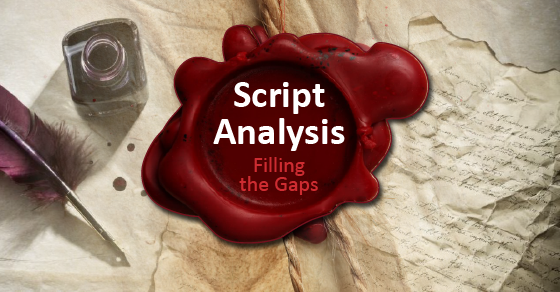Script Analysis for Actors – Six Ways to Fill the Gaps
This is part four of Script Analysis. You can get part one here, part two here, and part three here.
The first few Script Analysis articles focused on finding the information that the playwright has left for you in the script. But sometimes there is little to no information about your character. Don’t fret! This when you, as an actor, really get to stretch your creative muscles. The world is your oyster and it’s time to design your pearl.
Here are a few tools and techniques to fill in the gaps about your character.
Create a Dating Profile
Imagine your character is looking for their ideal partner. What qualities would they look for?
Dating website profiles are great tools for character development. They ask so many questions about you and your dreams/goals for life.
On the PDF version of this blog post (download link below) is an example of a dating profile (based on okcupid’s form) that you can use to build your character. I chose this one because the questions delve far beyond the superficial. I also love the six things question. Six things of what? It’s completely open-ended and you can interpret it any way you like.
Bonus tip: You could take two approaches to filling out this form. One would be to complete the profile 100% truthfully, and the other would be to complete it as the character would want the world to see them. (Would Richard III be forthcoming about his physical deformity?)
Job Application
The dating profile will help you dig deep into the personal relationships your character desires. Completing a job application can tell you about their professional goals.
On the PDF version of this blog post (download link below) is a typical job application form.
This form is very fact-based. A lot of the questions are closed-ended (i.e. they call for a yes or no answer). Be sure to elaborate as much as you can. For example,
Have you ever been charged with a felony?
No. I’ve committed a lot of felonies, but never been caught. I’m amazingly good at covering my tracks.
Bonus tip: As with the dating profile, you could take two approaches to filling out this form. One would be to complete the profile 100% truthfully. The other would be to stretch the truth a bit, answering the questions to give you the best chance of landing the job. (Would Willy Loman complete the questions about his previous job truthfully?)
Make a Diary
Imagine that your character keeps a diary.
Create some diary entries for them where they share their true thoughts. Assume your character is 100% certain that nobody else will read the diary. Write with nothing to hide.
Don’t worry about being “creative” or making the entries entertaining. The diary is not being written for anyone else but the character. Just focus on writing honest entries.
Here are some events to consider writing diary entries for:
- The day before the play starts.
- The day after the play ends.
- The day(s) your character met every other character in the play.
- If your character refers to any event in the past, write the diary entry for that day.
- The day they were happiest.
- The day of their fondest memory.
- The day they were the saddest.
- The day they were angriest.
- The day they started their first job.
- The day they made the hardest decision in their life.
- The day they saw their favourite movie for the first time.
Make Some Lists
Everybody keeps various lists. Lists can give you insight into your character. If you saw a stranger’s grocery list you’d learn not only about their eating habits, but you’d also learn quite a bit about their lifestyle. Here are some ideas for lists your character might keep. Make them up.
- Grocery List (what kinds of food does your character eat?)
- List of Best Friends (rank them in order)
- Frenemy List (which of your character’s friends really aren’t friends?)
- List of superpowers they’d like to have.
- Gift List for Self – things they hope to receive.
- Gift List for Others – possible birthday or Christmas presents they might get for other characters in the play.
- Five things they would save in a fire.
- List of chores, things that need to get done around the house.
- Book List – Books they want to buy/read.
Make an Avatar
What does your character look like? Well, they look like you because you’re playing them afterall. But what do you visualize them looking like?
Here are two great websites that will help you put together a “look” for your character. These sites let you choose hair colour, hair style, facial features, skin tone, clothing, facial hair, etc.
When you’re done, print a copy of the image and tape it in your script. Keep it as a reminder that you’re playing a character, and that the character is somebody different from you.
You might even use the avatar to co-ordinate with your show’s design team. Use it as a guide for the “look” of your character. How does your character change if you add glasses or facial hair? What would happen if you curled your hair, etc.
Make an Social Media Presence
Create social media profiles for your character.
Facebook is ideal for this because it’s so strongly centered on your life and your interactions with others. But Facebook doesn’t allow fake profiles. Instead use a website like Fakebook. Fakebook looks like Facebook but they let you create profiles for imaginary people. It’s perfect for this type of exercise.
- Document the events of the play through status updates.
- Does your character add any other characters as friends during the play?
- Does your character unfriend any other characters as friends during the play?
- What social issue pages does your character follow?
- What celebrities/politicians/public figures does your character follow?



